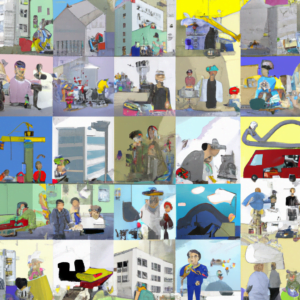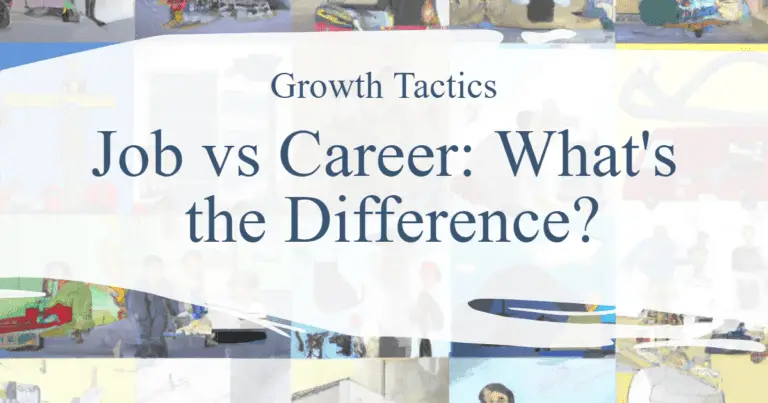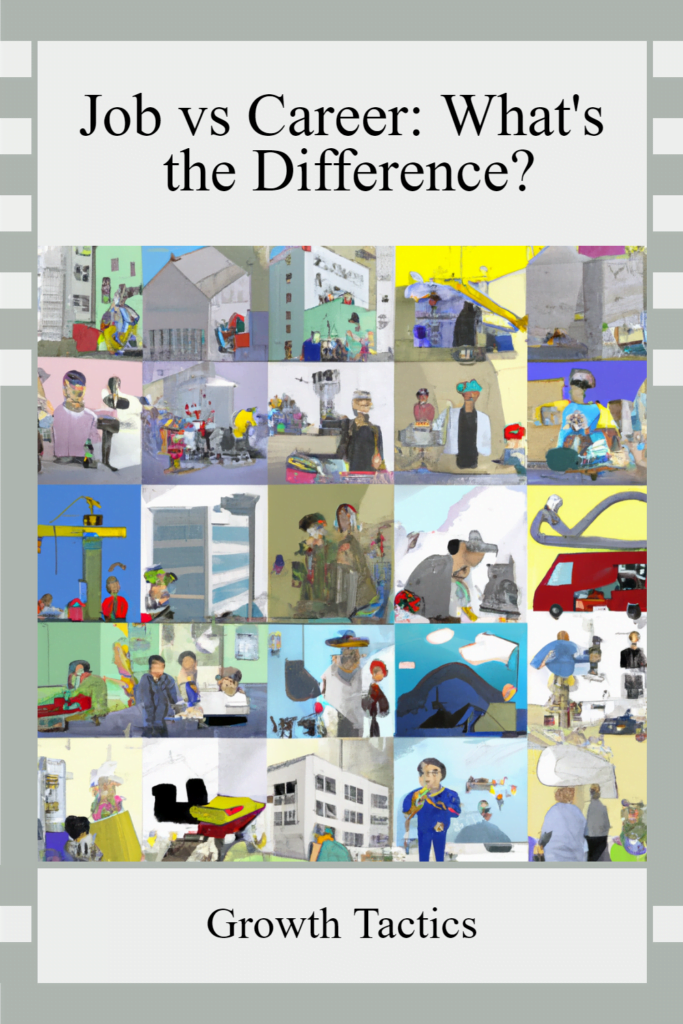Are you wondering what the difference is between a job and a career? You’re not alone. Many people don’t understand the difference between these two concepts, despite them being used interchangeably in many conversations. In this article, we’ll explore the differences between a job and a career and how each one can impact your life.
Jump To Section
The Difference Between a Job and a Career
A Job:
- Short-term Focus: Typically offers a connection to immediate needs such as salary, benefits, or other forms of compensation.
- Variety of Roles: Can encompass any type of work, from manual labor to executive positions, catering to specific skills or tasks.
- Stepping Stone: Often viewed as a temporary phase or a means to an end, serving as a stepping stone to future opportunities or roles.
- Task-Oriented: Concentrates on completing particular tasks or skills within a specified timeframe.
A Career:
- Passion-Driven: Not confined to traditional professional roles. Can encompass any area of life where one follows their passions and interests.
- Long-term Commitment: Represents a dedicated journey within a field of study or profession, requiring specialized knowledge and skills.
- Expertise Development: Involves continuous development and refinement of expertise in a chosen domain, aiming for higher levels of responsibility and advancement.
- Holistic View: Extends beyond immediate job roles, encompassing long-term goals, personal growth, and professional fulfillment.
A career is a journey
A career is a journey, where you have the opportunity to set and achieve long-term goals. It is important to be aware of your career journey and to take strides toward it. Having an understanding of your career path will help you achieve the goals that are most important to you.
When considering your career journey, you should consider where you want to be in the future and what steps you can take now to get there. You may need to think about how you can best utilize your skills, how continuing education or training can help move your career forward, and what additional resources might be available.
Taking into account these different aspects of your career journey will help ensure that you make informed decisions on the path ahead. With dedication and commitment, a successful career journey awaits!

Can you turn a job into a career?
In today’s market, it is important to have a variety of skills to find success. Whether you are looking to change careers or just gain new skills, working a job can help you achieve your goals.
You can turn a job into a career by doing things like taking on formal training or internships. This will give you the skills and experience you need to make the jump into your chosen field. When you have worked in several different fields, you will be better prepared for any future opportunities that come your way.
Working a job is not only good for improving your skills, but it is also good for building character. If you are committed to your job and take pride in your work, others will likely be as well.
Career goals are important when thinking about changing jobs. What are you trying to accomplish?
Do you want to move up the ladder faster? Or do you just want a different type of job that fits better with your personality?
Figuring out what you are aiming for will help guide you through the process of finding the right job and turning it into a career.
Example of careers
Careers can be very diverse and offer a lot of opportunities. A career may be in the private or public sector, in business, or in the arts. There are many different types of careers and paths that one can take. Some examples of career paths include:
– Medical doctor
– Lawyer
– Accountant
– Engineer
– Teacher
– Scientist
– Journalist
Finding the right career for you

What interests you?
Finding a career field that interests you can be one of the most difficult tasks you have to do. When it comes time to start searching for and determining what interests you, starting your journey of self-discovery is the best way to find your career path.
In this exploration process, take some time to reflect on yourself and consider what type of job would provide fulfillment in the long run. Do you want something creative or analytical that works with data? Would you like to work in an office environment or out in the field?
There are so many options, it’s important to weigh all your options and discover what truly resonates with your passions and skillset. When pursuing a career field that interests you, ask yourself questions like “What would get me out of bed in the morning without having any hesitations?” Once you answer these questions, I believe that truly finding your ideal career path will come much easier!
What skills and abilities do you have?
When trying to find your skills and abilities, it is important to assess what you can do, both mentally and physically. It is also important to look at the kinds of jobs that interest you so that you can focus on building your skills in those areas.
Researching various types of careers is beneficial for determining which one may be best for you. Once you have identified which career path you would like to pursue, invest in learning new skills and abilities needed within that field.
Learning new strategies and strategies related to the job will help you build upon your existing skills and increase the likelihood of success in that area. finding jobs that can give you work experience in your career path can be crucial for getting ahead.
Furthermore, never underestimate the importance of networking with other professionals in the same field. This can be key for finding mentors or even job opportunities, thus helping you advance further into your chosen career.
What’s your work style?
Different people have different work styles. I like to take my time and plan everything out before I start working. I also like having a lot of control over my work environment and the people I work with.
Do you prefer a quiet work environment or one that is more lively? I generally prefer a quiet work environment, although I’ve been known to work in more lively environments when needed.
Are there different work styles that are better for different types of jobs? Different work styles are better for different types of jobs. Some people may prefer a more hands-on approach while others may prefer to delegate more responsibilities.
What are your goals?
When it comes to your career, what are your ultimate goals? Do you want to work in a certain field for the rest of your life, or do you have different career goals you’d like to achieve someday?
No matter what your career goals are, it can be helpful to have a plan and some benchmarks to help you stay on track. Make sure to keep an eye out for new opportunities and keep up with industry trends so that you don’t stagnate. Finally, don’t be afraid to take some risks. If something calls out to you, go for it!
Find out what you need to get there
You need to figure out what you need to succeed to reach your career goals. Different jobs and careers require different skills and abilities. The most important thing is to be organized with a well-developed plan.
Make sure you have the qualifications and experience needed for the position you’re targeting, and stay up-to-date on industry trends. Networking is also key. Find people who can help you advance in your career. Finally, never give up on your dreams. If you put in the hard work, good things will happen.

Always Continue to Learn and Grow
In the dynamic landscape of your career development, one truth remains unwavering: continuous learning and growth are paramount. This principle doesn’t just apply to your professional life; it’s integral to your entire being. To evolve as both a person and a professional, it’s essential to keep pushing your boundaries, seeking out new opportunities, and expanding your knowledge base.
Whether you’re at an entry-level job or exploring pathways to a new career, every experience and lesson plays a pivotal role. The key is to never become complacent. Think of your progress like an Air Force mission, each step carefully planned, each objective clear, and each challenge an opportunity for growth.
Embrace Lifelong Learning
Seek New Opportunities: Don’t wait for chances to appear. Actively hunt for them. The workforce is teeming with potential if you remain vigilant and proactive.
Pursue Knowledge: Enroll in courses, attend seminars, and read extensively. Lifelong learning fuels your professional development and keeps you ahead of the curve.
Skill Enhancement: Focus on improving existing skills while acquiring new ones. This dual approach ensures you remain versatile and valuable in any role.
Resources at Your Disposal
Today, we are fortunate to have countless resources available at our fingertips. Online courses, professional workshops, mentorship programs, and industry conferences are just a few examples. Use these tools not as mere supplements but as integral parts of your career toolkit.
Purpose-Driven Growth
Growth for growth’s sake is aimless. Ensure that your efforts align with your professional goals. Each new skill and each bit of knowledge should bring you closer to your ultimate objectives. This purposeful approach not only enhances your career but also enriches your personal life.
Embrace Your Unique Path
Remember, every job, whether part-time or hourly, contributes to your journey. Recognize the value in each role, using it as a stepping stone toward your higher purpose. Whether you are driven by the importance of that next paycheck or the ambition to rise through the ranks, keep your eyes on the larger picture.
A Leadership Mindset
As a leader, embody the qualities of a mentor and a coach. Share your insights, encourage others to pursue their passions, and create an environment where continuous improvement is the norm. Leadership isn’t just about reaching the top; it’s about lifting others as you climb.
Chart Your Course
In the spirit of the Air Force, plan your missions with precision and purpose. Every decision and action should bring you closer to your goals. This requires disciplined effort, unwavering motivation, and a clear vision.
Hold the belief that learning and growth are not finite; they are lifelong commitments. With this mindset, you’ll not only achieve your professional aspirations but also inspire and lead others to do the same.
So, don’t halt your journey now. Push the envelope, explore the unknown, and strive to be the best version of yourself. The path to greatness is marked by continual learning and relentless personal and professional growth. Embrace this journey with confidence and purpose.
Your future self will thank you for it.
Did you enjoy this article on the difference between a job vs career? Please share and subscribe below.


